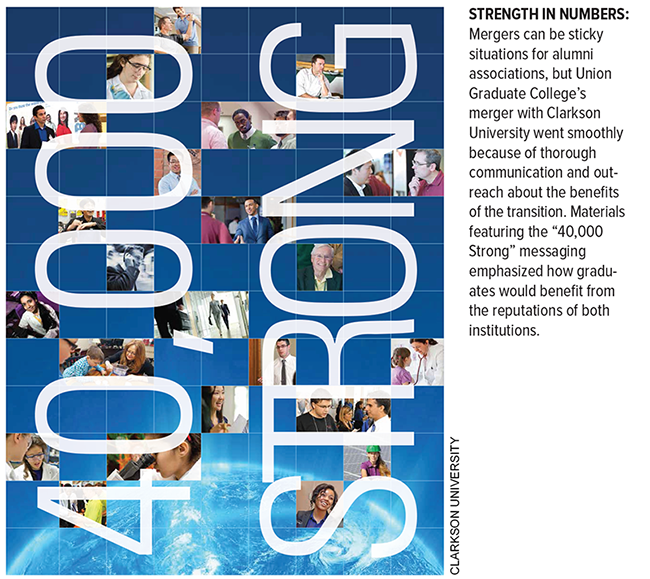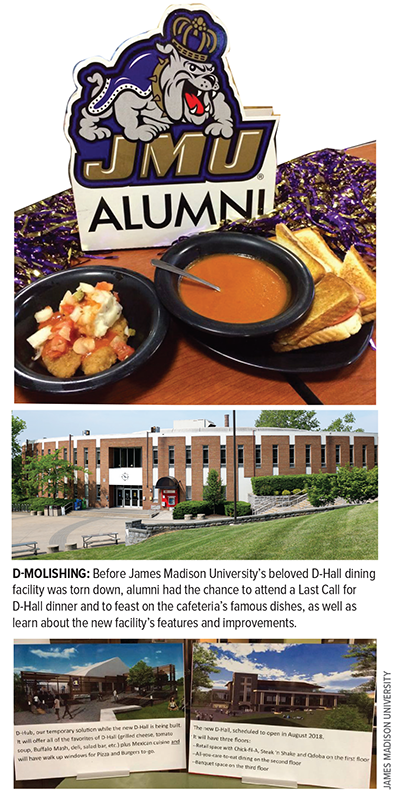No Lemons Here

Change happens. But that doesn't mean it's easy. Change can be threatening. An institutional merger or updated mascot, for example, can spark fears that alumni memories and traditions aren't treasured. In a job where keeping alumni happily engaged is key, how do you navigate the negative stuff?
We aren't talking about crises—bad news takes everyone by surprise. But if you know your alumni, you can predict when a big change for the institution is going to be a problem for some graduates. Before you start bracing yourself for hate mail, take a deep breath. With a proactive outreach plan, you can take part of the sting out of the unwelcome and maybe even turn the news into a positive for your alumni.
Don't ignore the angry ones
When Pennsylvania's Susquehanna University implemented its Global Opportunities program requiring students to have an off-campus cross-cultural experience, the university realized that, because of the Crusades' violent history, the institution's nickname and mascot, the Crusaders, weren't translating well globally.
"Some alumni who live overseas told us they had discarded their SU Crusader apparel because it didn't feel smart or safe to be wearing it," says Ron Cohen, vice president for university relations. "With the university's requirement that students complete a cross-cultural learning experience, and with many of those experiences happening outside the U.S., faculty had been advising students to be careful in what they bring with them."
The board of trustees believed it was time for a less controversial nickname. In the fall of 2015, the university announced that it wanted to replace the Crusaders, which had been the nickname since the 1920s.
The timing of the announcement made it a hot topic. The 2016 presidential election campaign was in full swing, fueling arguments about cultural sensitivity and political correctness. The name and mascot change hit a raw nerve. Some alumni argued that the institution valued political correctness over its own history.
SU alumni relations staff received a flurry of angry responses and resolved to reply to every message. "We wanted to honor people whether they were for or against the change," says Becky Deitrick, assistant vice president of alumni, parent, and donor engagement.
The staff kept responses simple and respectful, saying: "Thank you for taking the time to express your thoughts or feelings," followed by "I understand you are upset, and I'm sorry that is the case." Responding without judgment and thanking people for their feedback often helped neutralize alumni's anger, Cohen says.
"That took some heat out of the emotion," he says. "The people who were taking the time to comment care. If they didn't care, they wouldn't take the time."
This inclusive approach helped SU alumni relations staff connect with one particular alumnus who initially opposed the change. During the review process, the former student-athlete gathered feedback from classmates and teammates on why they wanted to keep the Crusaders name. Cohen was so impressed with the alumnus's work that he called him soon after the board made its decision.
"I said, ‘I wanted you to hear personally that it didn't go the way you wanted it to go,'" Cohen recalls. "He said he wasn't surprised, and then I invited him to join our committee to decide on the new name and mascot."
The alumnus accepted Cohen's olive branch, and the committee selected SU's new mascot: the River Hawks. The alumnus also joined the alumni board.
"One positive of the change is that people engaged who had never engaged before. There is no bad engagement. It means you love SU," Deitrick says.
To honor the Crusaders, the university library held a "history harvest" during the 2016 homecoming weekend. Alumni were able to view displays of Crusaders memorabilia and footage of 1950s football games and homecoming parades, as well as bring their own Crusaders items to be photographed for SU's archive. Students recorded alumni talking about their memories. The history harvest was so successful that the alumni board is considering making it an annual SU event.
Explain the rationale

Mergers between institutions are becoming more common but are still jarring for alumni nonetheless. When Clarkson University and Union Graduate College in New York's Albany region decided to merge in 2015, alumni generally took it in stride. UGC had been part of another institution until 2003, so it already had a history of change. Even though the response was mostly positive, some UGC alumni were unhappy with the decision.
"We know alumni feel connected to their alma mater and have pride in their institution," says Suzanne Smith, Clarkson University's advancement communications specialist for marketing and external relations. She and her staff wanted to respect that while clearly communicating the merger's benefits.
UGC's trustees opened up about the increasing difficulty of preserving the institution as a stand-alone graduate college. Clarkson's reputation in the region would help UGC graduates—its programs complemented UGC's in areas such as engineering and business.
To bolster support for the merger, Clarkson sought endorsements from business leaders in UGC's and Clarkson's major fields. The president of National Grid New York, the electric utility company, wrote a letter to the editor of the Times Union of Albany, arguing that the combined strengths of the institutions' energy programs would help propel the industry forward.
"One of the challenges with higher education is that we don't state the obvious. We assume everyone else is following the trends in higher education, so you have to talk about the rationales for your decisions," says Kelly Chezum, vice president for external relations for Clarkson. "I'm not a believer in ‘no comment.' We try to say ‘the current plan is.' It gives people confidence that you're speaking strategically about the decisions your institution is making and the choices it's facing."
Make remembering fun
Talking points and answering email are important, but a light touch can help cushion the blow of bad news.
Virginia's James Madison University is famous for its food, and its original main dining hall, Gibbons Hall, known as D-Hall (short for dining hall), helped cement that reputation with specialties like peanut butter pie and buffalo mash (a combination of chicken fingers, mashed potatoes, buffalo wing sauce, and ranch dressing) and food traditions like Grilled Cheese Thursdays. For decades, D-Hall brought people together and was a place to see and be seen.
But D-Hall needed costly plumbing updates and was also struggling to accommodate the growing student population. In 2014, JMU decided to tear down the dining hall and build a larger one.
"There was a collective ‘noooo' the minute people read the announcement," says Ashley Privott, executive director of alumni relations.
To celebrate D-Hall a final time, the alumni relations staff collaborated with the campus dining team to hold Last Call for D-Hall in April 2016, a homecoming event that served up all of the dining hall's famous dishes at once. More than 200 people attended, including about 100 alumni.

As they feasted on their favorite D-Hall treats, alumni learned about the plans for the new dining hall, which is slated to
be completed in fall 2018. JMU displayed a big board with renderings of the forthcoming facility and answered questions on topics ranging from the demolition and construction to the new menu, which will still offer the D-Hall classics.
"We knew we needed to help people see the future," Privott says. "The building may look different, but the feeling and food inside is going to be the same."
The University of Kansas took a more explosive but equally fun approach when it announced plans to implode its largest residence hall, McCollum, to make room for a parking lot for two new residence halls. The institution's alumni association had the idea of livestreaming the blast so alumni around the world could say goodbye.
"We knew it made good theater. We knew people would take an interest. You don't see a building blown up every day," says David Johnston, vice president of marketing and digital media at the KU Alumni Association.
The alumni association team had never streamed live video before. After receiving the university's permission, team members partnered with KU Information Technology to set up the connection and secured the site.
On the day of the demolition, they livestreamed on YouTube and embedded the video on the KU website. At the beginning of the broadcast, they aired a live feed to welcome viewers and then ran a prerecorded video that shared McCollum's history, information about the new residence halls, and stories about McCollum. Five minutes before the implosion, the video cut back to the live feed to capture the big moment.
The response was huge. During the live stream, more than 2,400 viewers tuned in, and the McCollum landing page in which the video was embedded set a new record as KU's most visited page ever.
Leading up to the broadcast, the association tried to memorialize the building with both humor and respect. The staff shared alumni's lighthearted jokes about the building's creaky, exposed pipes and occasional mold and also recognized the alumni for whom the building was named: Elmer McCollum, a biochemist who discovered vitamins A, B, and D, and his brother Burton, who pioneered the use of seismography in oil drilling.
"The best thing we did was ask alumni to share their thoughts and stories," Johnston says. The alumni association posted tributes from the university community on a dedicated McCollum webpage. Alumni shared stories of meeting their spouses at McCollum and seeing brave (and possibly inebriated) friends stand on the building's sixth-floor ledge. One alumna described the camaraderie that she shared with her fellow McCollum residents and the way they bonded over the building's idiosyncrasies, including the time she and three other people were trapped in an elevator.
"Let your alumni guide you in terms of what tone to take," Johnston says, adding that even the best communications plans may need to evolve and change as your stakeholders respond and react. "For some, change can be a difficult process that requires sensitivity. For others, it may take on a more fun-loving tone or viewpoint. Listen to your alumni."
5 Ways to Survive Angry Alumni
1. Survey alumni regularly.
"I am a firm believer in no surprises," says Margaret Dunning, a managing partner for the communications consulting firm Finn Partners. Having a solid understanding of where your alumni are on a variety of key issues will make your communication planning much easier, she says.
2. Know your alumni champions.
"Identify your alumni ambassadors, those independent third parties who can speak to other alumni and who can say: ‘I'm living in the community, I'm connected to the institution, and I'm supporting this decision,'" says Kelly Chezum, vice president for external relations at Clarkson University in New York. The ambassadors' influence can make the process of delivering unwelcome news run more smoothly.
3. Do not go M.I.A.
Your presence matters—continue to communicate and respond even when tension escalates. "Provide accurate, consistent information in as transparent a manner as possible," says Simon Barker, managing partner at Blue Moon Consulting Group. You want your alumni to hear from you, not from potentially incorrect media reports, Barker adds.
4. Acknowledge their feelings.
Listening can go a long way toward defusing angry constituents. A simple, "I hear you," can help people feel validated even if a decision doesn't go their way. "Reassure alumni that the mission and values that were a large part of their experience remain at the heart of the institution, even as other things change," says Erin Hennessy, vice president of TVP Communications.
5. Take time for self-care.
Remember it will be hard to do a good job if you're stressed and exhausted. "Some days you feel pretty beat up," so make sure you have an outlet to talk to people, says Becky Deitrick, assistant vice president of alumni, parent, and donor engagement at Pennsylvania's Susquehanna University. Negative feedback can take its toll after a while, so take time away from work in order to have balance, she adds.
About the author(s)
Virgie Townsend is a freelance writer and editor living in Syracuse, New York. Her work has been featured or is forthcoming in The Atlantic, The Washington Post, Harper's Bazaar, and other publications.